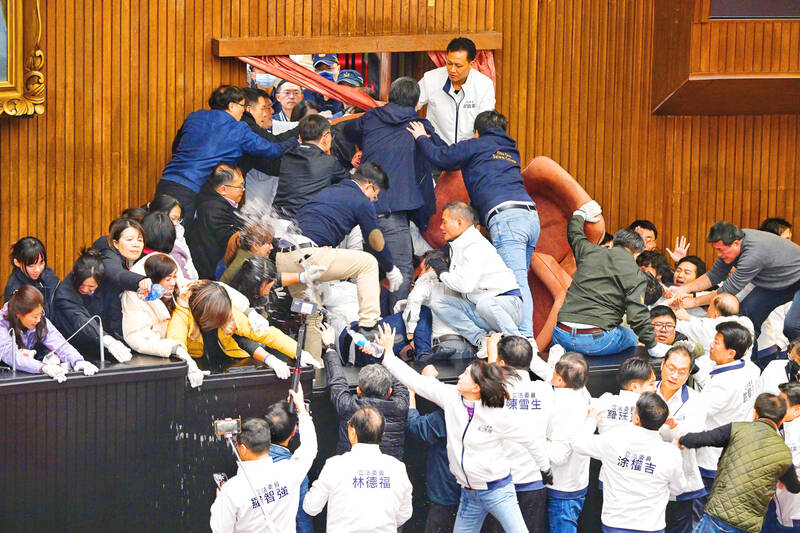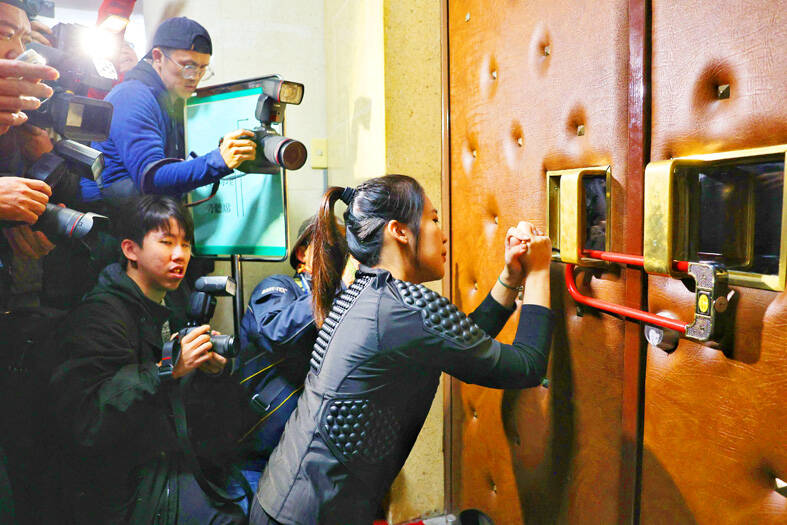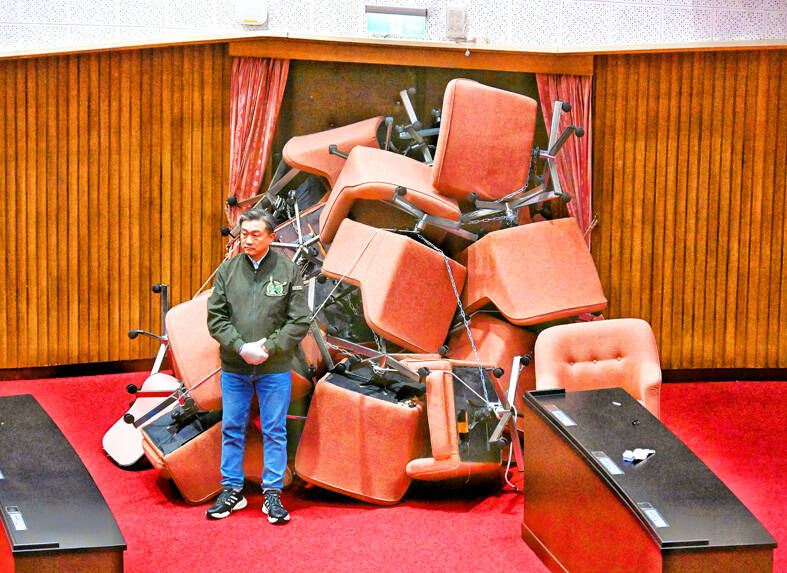Portions of controversial amendments to tighten requirements for recalling officials and Constitutional Court procedures were passed by opposition lawmakers yesterday following clashes between lawmakers in the morning, as Democratic Progressive Party (DPP) members tried to block Chinese Nationalist Party (KMT) legislators from entering the chamber.
Parts of the Public Officials Election and Recall Act (公職人員選舉罷免法) and Constitutional Court Procedure Act (憲法訴訟法) passed the third reading yesterday.
The legislature was still voting on various amendments to the Act Governing the Allocation of Government Revenues and Expenditures (財政收支劃分法) as of press time last night, after the session was extended to midnight.

Photo: Fang Pin-chao, Taipei Times
Amendments to Article 4 of the Constitutional Court Act require 10 judges to attend court sessions and nine judges to agree before legislation can be declared unconstitutional.
If the number of justices falls below the mandated 15, the president must nominate candidates to fill the roster within two months, amendments say.
If the number of justices recusing themselves from a review are seven or more, all remaining justices should participate in the review, it states.

Photo: I-Hwa Cheng, AFP
Amendments to the recall act state that those proposing a recall and those signing petitions must provide a print copy of the front and back of their National Identification Card.
If the information on the print copy is illegible, the petition should be nullified.
The amendments also stipulate that those found guilty of using someone else’s identification or forging an ID for a recall petition may face up to five years in prison or a fine of up to NT$1 million (US$30,589).

Photo: Fang Pin-chao, Taipei Times
At present, campaigners only have to present the ID numbers and registered addresses of endorsers of the recall petition to local election commissions, a process critics argue has been abused.
The Ministry of the Interior yesterday stated its opposition, saying that requiring print copies of an ID card poses risks to privacy rights, and the amendment’s lack of public support affects the citizenry’s right to recall government officials.
The KMT also demanded that the central government provide a more significant percentage of funding — NT$661.2 billion — to local governments, which opponents said might affect the central government’s budget and social welfare policies.
The ruling DPP believes the act should not be amended, while the Taiwan People’s Party (TPP) took the middle ground, proposing that the central government provide NT$27 billion in additional funding for local governments.
DPP legislators late on Thursday evening entered the chamber by breaking windows and barricaded the doors to prevent KMT legislators from entering.
At about 8:30am yesterday, KMT legislators began to try to force open doors around the podium.
They broke through the door and entered the chamber at around 9:13am, which led to verbal and physical clashes.
Meanwhile, TPP legislators held banners in the chamber that read “hold the meeting,” “no violence” and “democracy is blocked.”
At 11:40am, Legislative Speaker Han Kuo-yu (韓國瑜) made his way from the meeting room to the legislative chamber, but DPP legislators blocked his way at the door.
KMT legislators pulled DPP legislators away from the door, and Han was escorted to the chamber by security guards, but he was still pushed and shoved to the ground.
Citing the disorder, Han called a hand vote, in accordance with Article 35 of the Rules of Procedure of the Legislative Yuan (立法院議事規則), inciting cheers from KMT legislators.
The KMT would not allow President William Lai (賴清德) to go on a violent path, KMT Chairman Eric Chu (朱立倫) said, accusing the DPP lawmakers of reversing Taiwan’s democratic progress.
The DPP is implementing “martial law” in the Legislative Yuan, TPP caucus whip Huang Kuo-chang (黃國昌) told a news conference in the morning.
The KMT and the TPP were using their “majority dictatorship” to try to pass amendments that could bring irreversible harm to Taiwan’s democracy, so the DPP had to take action to safeguard Taiwan, DPP caucus chief executive Rosalia Wu (吳思瑤) said.
The coming weeks are crucial to the nation’s survival, DPP caucus whip Ker Chien-ming (柯建銘) wrote on Facebook on Thursday night.
There would be no more recalls if the amendments are instated, because it would allow the KMT and the TPP to “cooperate” with China by proposing any unconstitutional bill they want to “mess up” Taiwan, he said.
Any unconstitutional bill would go unchecked, as amendments to the Constitutional Court Procedure Act would prevent the Grand Justices from interpreting the Constitution, while amendments to the government expenditures act would leave no budget for the central government to implement any social welfare policy, Ker said.

ENDEAVOR MANTA: The ship is programmed to automatically return to its designated home port and would self-destruct if seized by another party The Endeavor Manta, Taiwan’s first military-specification uncrewed surface vehicle (USV) tailor-made to operate in the Taiwan Strait in a bid to bolster the nation’s asymmetric combat capabilities made its first appearance at Kaohsiung’s Singda Harbor yesterday. Taking inspiration from Ukraine’s navy, which is using USVs to force Russia’s Black Sea fleet to take shelter within its own ports, CSBC Taiwan (台灣國際造船) established a research and development unit on USVs last year, CSBC chairman Huang Cheng-hung (黃正弘) said. With the exception of the satellite guidance system and the outboard motors — which were purchased from foreign companies that were not affiliated with Chinese-funded

PERMIT REVOKED: The influencer at a news conference said the National Immigration Agency was infringing on human rights and persecuting Chinese spouses Chinese influencer “Yaya in Taiwan” (亞亞在台灣) yesterday evening voluntarily left Taiwan, despite saying yesterday morning that she had “no intention” of leaving after her residence permit was revoked over her comments on Taiwan being “unified” with China by military force. The Ministry of the Interior yesterday had said that it could forcibly deport the influencer at midnight, but was considering taking a more flexible approach and beginning procedures this morning. The influencer, whose given name is Liu Zhenya (劉振亞), departed on a 8:45pm flight from Taipei International Airport (Songshan airport) to Fuzhou, China. Liu held a news conference at the airport at 7pm,

Taiwan was ranked the fourth-safest country in the world with a score of 82.9, trailing only Andorra, the United Arab Emirates and Qatar in Numbeo’s Safety Index by Country report. Taiwan’s score improved by 0.1 points compared with last year’s mid-year report, which had Taiwan fourth with a score of 82.8. However, both scores were lower than in last year’s first review, when Taiwan scored 83.3, and are a long way from when Taiwan was named the second-safest country in the world in 2021, scoring 84.8. Taiwan ranked higher than Singapore in ninth with a score of 77.4 and Japan in 10th with

GRIDLOCK: The National Fire Agency’s Special Search and Rescue team is on standby to travel to the countries to help out with the rescue effort A powerful earthquake rocked Myanmar and neighboring Thailand yesterday, killing at least three people in Bangkok and burying dozens when a high-rise building under construction collapsed. Footage shared on social media from Myanmar’s second-largest city showed widespread destruction, raising fears that many were trapped under the rubble or killed. The magnitude 7.7 earthquake, with an epicenter near Mandalay in Myanmar, struck at midday and was followed by a strong magnitude 6.4 aftershock. The extent of death, injury and destruction — especially in Myanmar, which is embroiled in a civil war and where information is tightly controlled at the best of times —